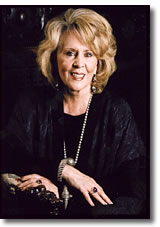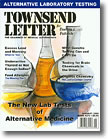Holistic Nurses Are
Part of the CAM Healthcare Team
Barbara Dossey, RN, PhD, started out
as ICU nurse, and did bedside critical care nursing for ten years.
She continued as a part-time critical
care nurse and critical care educator for another 15 years. At the
same time, she has always been committed to holistic nursing, which
means nursing that has enhancement of healing for the whole person,
from birth to death, as its goal.
 Holistic nurses are sometimes thought of as "those woo-woo people." The
expression "holistic nursing" first came into use in the
late sixties and early seventies, to describe nurses who use complementary
methods. In fact, holistic nurses have solid traditional nursing skills,
and holistic concepts have been part of nursing from its very beginning,
Dossey says. Holistic nurses are sometimes thought of as "those woo-woo people." The
expression "holistic nursing" first came into use in the
late sixties and early seventies, to describe nurses who use complementary
methods. In fact, holistic nurses have solid traditional nursing skills,
and holistic concepts have been part of nursing from its very beginning,
Dossey says.
From the start of her professional career, she's used mind-body
skills and other holistic tools as throughout her nursing practice. "For
example, in a critical care unit a patient comes in with acute myocardial
infarction, and you give them morphine," she says. "They're
still anxious and scared to death. How do you, as a nurse, continue
to facilitate their healing process? After I give the medication I
tell them, 'here's something you can do right now that
will help you. Just take a breath in, and as you exhale, feel yourself
getting a bit more relaxed. Allow the mattress to support you. Let
yourself sink into the bed and watch your breathing.'" This
sort of breathing exercise can help any patient who is feeling anxious
and scared. The holistic perspective isn't something you tack
on at the end of the day, Dossey says. "In holistic nursing practice
we strive to facilitate healing for the whole person. You hope to create
a healing environment, internally and externally. Nurses who embody
a holistic perspective recognize themselves as instruments in the healing
process."
Holistic Nursing Consultants Advise on Curriculum and Programs
Dossey was a founding member of the American Holistic Nurses Association.
Today she serves as the director of Holistic Nursing Consultants,
working together with Lynn Keegan, RN, PhD, and Cathie Guzzetta,
RN, PhD. She and her partners consult with hospitals, schools of
nursing and interested lay audiences about the role of nurses and
their holistic perspective within the integrative practice movement.
They have a special interest in curriculum development.
They've also written an exhaustive compendium of materials on
holistic nursing, Holistic Nursing: A Handbook for Practice,
now in its fourth edition. This book discusses strategies for using
self-assessments,
relaxation, imagery, nutrition, exercise, and aromatherapy to aid patients,
and also addresses self-healing and self-care for caregivers. Online
holistic nursing web modules accompany the text; see http://www.nursing.jbpub.com/holistic for
more information.
Holistic Nurses Are Part of the CAM Healthcare Team
As healthcare organizations add mind-body methods and other CAM interventions
to their array of services, they should remember that holistic nurses
can be a valuable resource, Dossey says. Many nurses are trained
in a wide range of methods, including:
- Aromatherapy
- Art Therapy
- Counseling
- Exercise and Movement
- Goal Setting and Contracts
- Guided Imagery
- Healing Touch
- Meditation
- Music and Sound Therapy
- Nutrition Counseling
- Relaxation Modalities
- Self-Care Interventions
- Smoking Cessation
- Weight Management
"We are in a time right now
where we can truly have an integrative healthcare collaboration,"
Dossey says. "Nurses have a
background that can complement almost everything other practitioners
are doing. Use us."
Florence Nightingale, Founder of Holistic Nursing
Many of us think of Florence Nightingale, who organized a nursing corps
during the Crimean War, as the romantic "lady with a lamp." In
fact, she was a formidable organizer who founded the profession of
nursing, and was a pioneer in public health and sanitation, holistic
health, health statistics and evidence-based practice.
Dossey has been inspired by Nightingale for many years, and in 2000
she published Florence Nightingale: Mystic, Visionary, Healer.
This book focuses on Nightingale's entire life and her deeply personal
spirituality, which supported her through the challenges of her enormous
pioneering work load, plus her own chronic illness.
Recently Dossey and others have published Florence Nightingale
Today: Healing, Leadership, Global Action,
which includes two of Nightingale's major works, her letters to nurses
(originally published over a 28-year
span) and her 1983 essay "Sick-Nursing and Health-Nursing." In
this essay, Nightingale calls for a perspective that goes beyond caring
for the sick and treating symptoms, and also looks at "the art
of health, the cultivation of health." Nightingale writes that "health
is not only to be well, but to use well every power we have." These
ideas are as important for us all today as when they were first written.
The book includes a valuable chapter by Deva-Marie Beck, RN, PhD, on
the historical circumstances surrounding the essay, and the implications
of its ideas. Although this book is primarily intended for nurses,
there is much in it that would interest other healthcare practitioners
and the general public.
Nurses As Resources for People with Chronic Illness
Dossey is excited about the initiatives consumers are taking these
days to learn about and monitor their own illnesses. "Consumers
are so knowledgeable today, and everybody has access to the Internet." She
advises them to be as clear as possible about their symptoms. For
example, keep a diary. "If it's something that's
chronic and building up, track that pattern for three or four weeks.
Then when you see your clinician, you can describe the pattern of
symptoms accurately, and your information may assist in creating
the best treatment for you."
"Don't go in there with fifty pages you've downloaded
from the internet," she adds. "Do bring a one-page summary
of the symptom patterns you've observed."
Each nurse has a different mix of training, skills and experience.
To find a nurse who has holistic nursing skills, or a special interest
in a particular disease, contact your state nursing association, and
your local help line.

Resources
http://www.dosseydossey.com
http://www.NIGHCommunities.org
Holistic Nursing: A Handbook for Practice (4th
edition, 2005, Jones and Bartlett)
Visit http://www.nursing.jbpub.com/holistic for
more information on web-based
modules to accompany this book.
Florence Nightingale Today: Healing, Leadership, Global Action (2005,
www.Nursesbooks.org,
a publication of the American Nurses Association)
Florence Nightingale: Mystic, Visionary, Healer
(2000, Lippincott, Williams & Wilkins)

Elaine Zablocki is the former editor of CHRF
News Files and Alternative
Medicine Business News.
|





 Holistic nurses are sometimes thought of as "those woo-woo people." The
expression "holistic nursing" first came into use in the
late sixties and early seventies, to describe nurses who use complementary
methods. In fact, holistic nurses have solid traditional nursing skills,
and holistic concepts have been part of nursing from its very beginning,
Dossey says.
Holistic nurses are sometimes thought of as "those woo-woo people." The
expression "holistic nursing" first came into use in the
late sixties and early seventies, to describe nurses who use complementary
methods. In fact, holistic nurses have solid traditional nursing skills,
and holistic concepts have been part of nursing from its very beginning,
Dossey says.